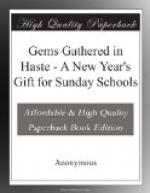Another day, Miss L—— brought home two large chickens; one of them with a long neck, and a beautiful black crest upon her head, and a dress of black feathers softer than velvet. Her we named Donna: sometimes we call her Bella Donna. The other was dressed in white feathers, some of them tipped with glossy black and brown, but many of them pure white. She was named Luca. They were shut together for a few days, until they began to feel at home; then they were set free to scratch in the barn-yard, and get acquainted with the neighbors’ fowls, when we began to see how different they were in character as well as dress. Donna holds her head very high, and pays no attention to any other hens; runs away from us, when we invite her to dinner, no matter how nice it is; and never will get acquainted, all we can do. But Luca we love as we should a gentle, timid little girl. Sometimes, when we open the door, there she stands patiently waiting, and looks up at us with her bright eye so pleasantly, that we must stop, if ever so busy, and feed her. Occasionally we hear a gentle sound on the door-step, which we all know; then some one is sure to exclaim, “There’s Luca,” and run to get her something nice to eat. The little chickens, with Mater their mother, all come rushing, tapping, perching, chirping at the door, and tease and tap-tap and “yip-p yip-p” until we quite weary of them. If the door stands open, they fly up the steps, walk in, look round the room, and pick up any thing they can find, until we send them away. The moment their tin pan appears, they are all in a flying huddle, tumble over each other, fly to the pan, to our shoulders, or anywhere, to get the first mouthful. Old Mater is ravenous and impolite as the rest, except that she always waits for her children to get a few mouthfuls first; but not another hen or chicken must come near them. Luca, patient gentle Luca, often stands and waits modestly behind; and, if she gets nothing, makes a little mournful sound,—that is all.
Some flocks of russet, black and brown hens, crowers, and chickens, who live close by, are a great annoyance to Mater, and to all of us. They come shooting into the yard like little steam-engines, and snatch all they can of the dinner to which they were not invited; and, if driven away a dozen times, rush back, the first chance, to get and devour all they can. Why, they have been into the house, and eaten a pie which was set to cool, pecked at the apples, Pony’s oats, and any thing they could find to eat! What would you have said then? Even Mater’s children never did such impertinent things, hungry as they always are. One white chicken about their size, a naughty-looking little thing, with her head always down, left her own mother, and would come dashing in as if she belonged among them; but Mater and her little ones always found her out, and sent her away.




